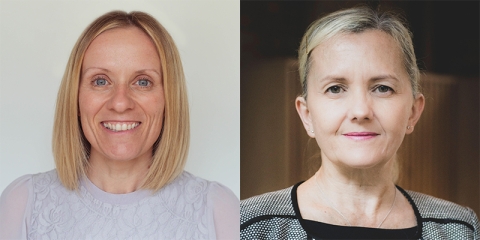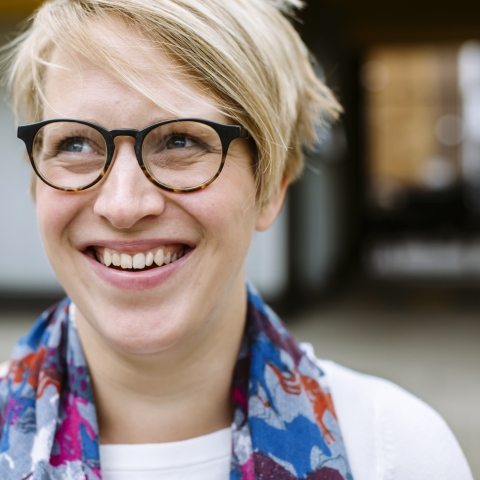

Discover how the university ensures every member of our university community becomes a successful Portsmouth graduate
5 min read
In this blog, I describe my recent collaboration with Fiona Hnatow, the University’s Chief People Officer, to ensure that every member of our University community embodies and models the attributes that support our students to become successful Portsmouth graduates.
Whole organisation learning for socially just education and outcomes audio transcript
Our principles for student success, The Hallmarks of a Portsmouth Graduate, concretise our dedication to enabling students to develop a commitment and responsibility for inclusivity, social justice, ethical practice, wellbeing and sustainability.
This ethos is paralleled across our entire institution with a University People Strategy 2030 that is built upon core values of equity of opportunity, the celebration of diversity, inclusion and belonging. These values underpin our core business of sustaining our thriving diverse community, that through creativity, imagination and innovation continues to produce world-leading research, offers students a life-changing education for successful graduate outcomes, and, that as a civic university, we continue to enhance the wellbeing of our wider community.
A reimagined higher education
As a Principal Lecturer for Equality, Diversity and Inclusion (EDI) in Academic Development my motivation is drawn from a reimagined higher education (Arday, Belluigi, and Thomas, 2021; Zembylas, and Bozalek, 2017; Roegman, et al 2021) where awarding gaps do not exist, every student can authentically, and most importantly, transparently belong, and where students have maximum agency over their educational outcomes as structural, cultural and institutional barriers to success have been identified and dismantled.
I believe, that in recognition that it was early academia, scientists and scholars who were instrumental in creating knowledge that categorised and divided humankind in ways that afforded imperialism (Galton, 1886; Huxley, 1870), it logically falls to the contemporary beneficiaries to undo these legacies (Bhambra, Gebrial, and Nişancıoğlu, 2018) and to ally with those who have previously been excluded from, or on the margins of, the knowledge economy as they claim their rights to shape epistemology.
A foundation of all educational activity
Part of my role has been to design a suite of training that affords academic staff with knowledge of the value, and values of socially just education, generates the motivation to ensure EDI is a foundation of all educational activity and equips colleagues with a range of pedagogical strategies for EDI. Building upon a pilot methodology developed to promote authenticity and psychological safety when exploring emotive, often polarising issues, this training also offers advanced multi-disciplinary facilitative techniques (Social Work, Counselling, Mediation) helpful in creating learning environments that can interrogate issues of oppression in ways that bring diverse learning communities closer together (Arao and Clemens; 2013; Cook-Sather, 2016; Perez-Putnam, M. 2016).
Session One in the Suite, ‘Understanding Positionality’, provides a broad, albeit whistlestop, foundation that supports staff, whatever their discipline, to consider not only the complexity of positionality (Secules, et al 2021; Folkes, 2022) but 25 elements of human identity.
With this knowledge participants reflect upon themselves and consider whether they have had the power and/or agency to construct and assign the labels they hold, as well as identify any associated opportunities, or barriers they have encountered at a personal, institutional or cultural level (Thompson, 2017) all through the lens of intersectionality (Cooper, 2015). This reflexive learning being crucial for universities as they grapple with engagement, belonging and awarding gaps (McMaster, 2021), and strive to negate the continued harm from colonial legacies (Bhambra, Gebrial, and Nişancıoğlu, 2018).
Hallmarks of a Portsmouth graduate
In my role, I believe the Hallmarks of a Portsmouth Graduate are equally the necessary attributes of all our staff, and foresee great value in providing opportunities for all colleagues, not only student facing or academic, to learn about and interrogate issues of identity, social justice and power. This ensures that our entire community is informed, enabled and empowered to act with intention, and integrity.
This view is shared by Fiona Hnatow, who was looking for new ways to actualise the commitments to EDI within the People Strategy. Fiona wanted to ensure all professional service colleagues were equipped with understanding of the ways that inequality, oppression, discrimination, and disadvantage can manifest as barriers to learning and working, and in doing so, begin to realise the ambitious aspirations for all University of Portsmouth people.
With these shared ambitions, Catherine and I launched a series of workshops earlier this year, starting with our own HR team of 60. Led by Catherine we explored our own positionality, associated power dynamics and how these can influence the way in which we experience and anticipate others, bias our perspectives, judgments and activities at work – basically impact how we lead, manage, form relationships and make decisions.
Fiona Hnatow, University's Chief People Officer
The elements of identity were broken down into accessible bitesize learning with an energetic and interactive delivery that enabled some brave reflexive engagement, the generation of ideas and debate, opportunities for problem solving, and the desire to continue further learning. Feedback regarding the impact of this training on practices moving forward has been overwhelmingly positive and for some transformational.
Fiona Hnatow, University's Chief People Officer
Fiona and I agree that this initial training has formed a robust foundation upon which to continue learning and thriving as a cohesive, collaborative, and motivated institution. We recognise that as a collection of intersectional humans with varying ancestries, and complex identities comprising of parts that may be stigmatised, privileged, hidden or visible to others. that together we can do the compassionate work of learning from lived experience, reflecting upon ourselves with cultural humility (Singh, et al. 2022), dismantling practices and structures that inhibit or favour, with the common goal of supporting our students to succeed.
Or, in our words, empower students to meet and exceed the expectations in our Student Charter, develop the characteristics outlined in our Hallmarks – and, in doing so, set themselves on the path to a successful and fulfilling career.
Author: Dr Catherine Murgatroyd is Principal Lecturer for Equality, Diversity and Inclusion at the University of Portsmouth.
References
Arao, B., and Clemens, K. (2013). From safe spaces to brave spaces. The art of effective facilitation: Reflections from social justice educators, 135, 150.
Arday, J., Zoe Belluigi, D., and Thomas, D. (2021). Attempting to break the chain: Reimaging inclusive pedagogy and decolonising the curriculum within the academy. Educational Philosophy and Theory, 53(3), 298-313.
Bhambra, G. K., Gebrial, D., and Nişancıoğlu, K. (2018). Decolonising the university. Pluto Press.
Cook-Sather, A. (2016). Creating brave spaces within and through student-faculty pedagogical partnerships. Teaching and Learning Together in Higher Education, 1(18).
Cooper, B (2015) in Disch, L. J., and Hawkesworth, M. E. (Eds.). (2016). The Oxford handbook of feminist theory. Oxford University Press.
Dunbar-Morris, H., Barlow, A., and Layer, A. (2019). A co-constructed curriculum: a model for implementing total institutional change in partnership with students. The Journal of Educational Innovation, Partnership and Change, 5(1).
Folkes, L. (2022). Moving beyond ‘shopping list’ positionality: Using kitchen table reflexivity and in/visible tools to develop reflexive qualitative research. Qualitative Research, 14687941221098922.
Codiroli McMaster, N (2021) Ethnicity Awarding in UK Higher Education 2019/20, Advance HE.
Galton, F. (1886). Regression towards mediocrity in hereditary stature. The Journal of the Anthropological Institute of Great Britain and Ireland, 15, 246-263.
Huxley, T. H. (1870). On the geographical distribution of the chief modifications of mankind. The Journal of the Ethnological Society of London (1869-1870), 2(4), 404-412.
Perez-Putnam, M. (2016). Belonging and brave space as hope for personal and institutional inclusion. Teaching and Learning Together in Higher Education, 1(18), 2.
Roegman, R., Reagan, E., Goodwin, A. L., Lee, C. C., and Vernikoff, L. (2021). Reimagining social justice-oriented teacher preparation in current sociopolitical contexts. International Journal of Qualitative Studies in Education, 34(2), 145-167. DOI: https://doi.org/10.1080/09518398.2020.1735557
Thompson, N. (2017). Social problems and social justice. Bloomsbury Publishing.
Secules, S., McCall, C., Mejia, J.A., Beebe, C., Masters, A.S., L. Sánchez-Peña, M. and Svyantek, M., 2021. Positionality practices and dimensions of impact on equity research: A collaborative inquiry and call to the community. Journal of Engineering Education, 110(1), pp.19-43.
Singh, H., Sangrar, R., Wijekoon, S., Nekolaichuk, E., Kokorelias, K. M., Nelson, M. L., and Colquhoun, H. (2022). Applying ‘cultural humility’ to occupational therapy practice: a scoping review protocol. BMJ open, 12(7), e063655.
Zembylas, M., and Bozalek, V. (2017). Re-imagining socially just pedagogies in higher education: The contribution of contemporary theoretical perspectives. Education as Change, 21(2), 1-5 DOI: http://dx.doi.org/10.17159/1947-9417/2017/3051.
More Education Matters Blogs
Inspirational Insights
Discover how the CCI Learning and Teaching Conference brought together colleagues across all schools in the Faculty to discuss, share and showcase Creative Teaching and Learning.
Claire Bailey-Ross
27 April 2023
7 min read

A point for reflection
Discover how we're helping students develop the Hallmarks of a Portsmouth Graduate through a range of extracurricular activities.
13 April 2023
5 min read

